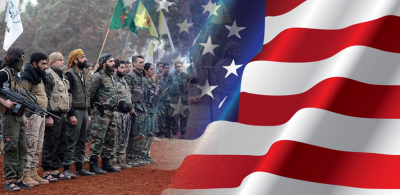Syria’s Kurdish Led SDF: “Border Force” or “Terror Army”?

The US announced that it will train a 30,000-strong “border force” of the Kurdish-led SDF in Northern Syria in a controversial move that was immediately slammed by Turkey as the creation of a “terror army”. President Erdogan has long been opposed to the establishment of a de-facto Kurdish statelet along his country’s southern border, and the US strategy is playing right into his greatest fears. Speaking to his supporters earlier this week, he bellowed that “a country we call an ally is insisting on forming a terror army on our borders. What can that terror army target but Turkey? Our mission is to strangle it before it’s even born.”
Syrian Deputy Foreign and Expatriates Minister Fayssal Mikdad stated that the US-Kurdish move “is an attempt to divide Syria and prolong the crisis in the country”, and President Assad had previously claimed that Kurdish and other forces who cooperate with the Americans are “traitors”. Russian Foreign Minister Sergei Lavrov told reporters during a large press conference that “this causes serious questions, concerning the maintenance of Syria’s territorial integrity”, though reaffirming that the Kurds are still an integral part of the Syrian nation and will nevertheless be represented in some capacity or another at the upcoming Sochi Summit at the end of the month.
The US is coy about its true intentions in building up a massive force that’s expected to be almost 50% larger than its own Border Patrol at home and deployed along the much geographically smaller area of the Turkish border and the so-called “deconfliction line” with the Syrian Arab Army in the Euphrates River Valley, but some observers are seriously concerned that Washington is trying to transform this anti-terrorist militia into a competent anti-state conventional fighting force, pointing to the large amount of weapons and equipment that they’ve received over the past couple of years. Most alarmingly, however, and in a move that could confirm these suspicions, reports have recently piled in that the US secretly gave MANPAD anti-air missiles to the Kurds, which if true would prove that they’re indeed capable of becoming an anti-state threat, whether to the Syrians, the Turks, or possibly even the Russians.
The Kurdish issue thus risks becoming the first post-Daesh crisis in Syria for this very reason, made all the more urgently important because of Turkey’s threats to eliminate the problem before it matures, and all eyes are on President Erdogan to see if he’ll make a move on the northwestern region of Afrin in the two weeks prior to the upcoming Sochi Summit and inadvertently risk subverting it, which might be exactly what the Americans are trying to tempt him into doing.
*
Andrew Korybko is an American Moscow-based political analyst specializing in the relationship between the US strategy in Afro-Eurasia, China’s One Belt One Road global vision of New Silk Road connectivity, and Hybrid Warfare.
Featured image is from the author.

